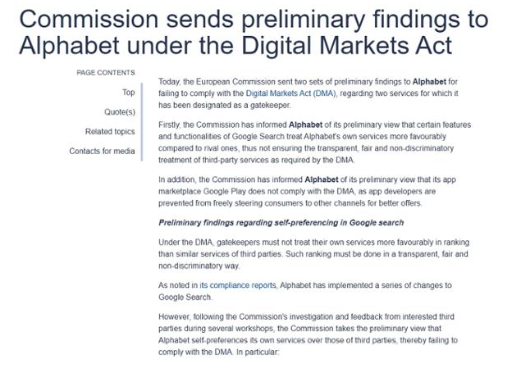
The European Commission, the executive branch of the European Union (EU), announced on the 19th that it will impose a fine on Alphabet, Google’s parent company. It is said to have violated the Digital Markets Act (DMA), which states not to abuse the superior position of big tech companies. This is the first time that the Commission has announced the results of its investigation since the full implementation of the DMA in March last year. Although U.S. President Donald Trump warned that he would retaliate with tariffs if he pressured U.S. big tech companies, he pushed ahead with the enforcement of related regulations. According to the Commission’s announcement and foreign media reports such as the Guardian of the UK and CNBC of the US, the Commission announced the preliminary results of its investigation that “Alphabet’s Google search and Google Play violated the DMA.” DMA is a law that designates seven platform operators (Alphabet, Amazon, Apple, Meta, Microsoft, ByteDance, BookingCom) as “gatekeepers” and specifically regulates them to prevent platform giants from abusing their market power.
According to the EU preliminary survey results, Google Search has taken a so-called “self-preference” policy that more advantageously exposes Google’s own services when searching for airline tickets and hotel reservations. The Commission believes that this violates the DMA rule that “competitive services should be treated transparently, fairly and without discrimination.” In addition, the Commission pointed out that Google Play, Alphabet’s application-buying platform, technically restricts external app developers from offering users cheaper products or guiding users to alternative payment methods. Alphabet countered. Oliver Vettel, head of Google’s European, Middle East, and African competition, said, “Change the way search results are displayed will not only cause difficulties for users to search, but also reduce traffic for European companies,” adding, “This (the Commission’s judgment) is simply wrong.” The final conclusion may differ from the results of the preliminary investigation, as Alphabet has said it can exercise its right to object to the EU and the Commission will consult corrective measures with Alphabet. However, if the DMA violation is finally confirmed, Google will have to pay a fine equivalent to up to 10% of global sales, and if the violation is repeated, the fine will increase to 20%.

The Commission also adopted a separate DMA decision against Apple. “Improve interoperability so that Apple’s iPhones and iPads are compatible with other brands of smartwatches, headphones and TVs.” This means “Open up the closed Apple ecosystem to the outside world.” “The improved interoperability will provide a more open environment for developers, provide more options for European consumers, and promote the launch of innovative products and services,” the Commission said.
The decision on Apple is a legally binding document that adopts measures that must be implemented to comply with the DMA, which is different from the decision on Google’s counterpart, which determines whether Apple violates the law. This means that Apple will not be fined immediately. However, Apple said in a statement, “The executive decision makes us tied to unnecessary regulations,” and added, “It forces us to hand over our new functions to our unregulated competitors for free.”
The EU’s move is likely to provoke the Trump administration. Last month, President Trump called the series of measures “extortion,” claiming that the EU’s digital services tax, fines, and regulatory policies unfairly target U.S. tech companies. Of the seven companies designated by the EU as gatekeepers, five are U.S. companies, except TikTok parent ByteDance and travel-related platform BookingCom.
It is also expected to serve as a negative factor in the already sharp trade conflict between the EU and the United States. Last month, the White House said that President Trump ordered related ministries to investigate the DMA and others, and that “President Trump ordered them to review tariffs to respond to digital service taxes, fines, practices and policies imposed on the United States by foreign governments.” Tensions between the two sides have been heightened as the Trump administration imposed tariffs on steel and aluminum imports last week, and the EU announced retaliatory tariffs, including 50% tariffs on whiskey as a retaliatory measure.
SAM KIM
US ASIA JOURNAL



